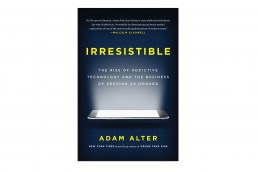Jan Böhmermann 'recipe' for a corporate pop hit
Jan Böhmermann shows us how it’s done in Germany. A hit written in 30 minutes and a clip using some original footage of Jim Pandzko (an alter ego of Jan Böhmermann) and a lot of stock images and video. The lyrics have been selected by chimps and are derived from calendars, tweets and other ‘found footage”. It also contains (fake) product placements. The hit is called Menschen, Leben, Tanzen, Welt. (People, Life, Dancing, World)
Why this selection?
This highly personal selection is about (business) ideas I think are worth seeing, reading, knowing and possibly spreading.
I think there can be learnt a lot from what other people say, do or make in business.
My selection focusses on art, fashion, science and pop culture but isn’t fashionable, trendy or scientific.
This website only costs money and time and never earned me a single euro (insert other currency here).
All copyrights of post which contain images, video, wiki text, etc. etc. belong to their respective owners.
However:
Visit my business site lukemac3000.com to see what I’ve done with business ideas.
Posh pawn - Great TV - Great business model
https://www.prestigepawnbrokers.co.uk/posh-pawn-tv-show-channel-4/
Nathan Barley - In 2005 light years ahead
Nathan Barley is a British Channel 4 television sitcom written by Charlie Brooker and Chris Morris, starring Nicholas Burns, Julian Barratt, Claire Keelan, Richard Ayoade, Ben Whishaw, Rhys Thomas and Charlie Condou. The series of six weekly episodes began broadcasting on 11 February 2005 on Channel 4.
"I'm a self-facilitating media node"
Nathan Barley
According to Digital Spy, Nathan Barley was “a flop when it originally aired, but a cult hit on DVD”. It pulled in 700,000 viewers and a 3% share.[4]
The series features a (nowadays) famous cast such as:
- Nicholas Burns – Nathan Barley
- Julian Barratt – Dan Ashcroft
- Claire Keelan – Claire Ashcroft
- Richard Ayoade – Ned Smanks
- Ben Whishaw – Pingu
- Rhys Thomas – Toby
- Noel Fielding – Jones
- Spencer Brown – Rufus Onslatt
- Charlie Condou – Jonatton Yeah?
- David Hoyle – Doug Rocket
- Nina Sosanya – Sasha
- Kevin Eldon – Nikolai the Barber
- Julia Davis – Honda Poppet
- Benedict Cumberbatch – Robin
Nathan Barley, played by Nicholas Burns, is a webmaster, guerrilla filmmaker, screenwriter, DJ and in his own words, a “self-facilitating media node”. Whilst desperate to convince himself and others that he is the epitome of urban cool, Nathan is secretly terrified he might not be, which is why he reads Sugar Ape magazine, his bible of cool.
The website (trashbat.co.ck) consists of stupid pranks caught on camera, photos of him with attractive women and famous figures (some of them digitally edited to insert himself), and photos of him standing on street corners in major cities around the world.
The humour derives from the rapid rise of both the Internet and digital media, and the assumption by publishers and broadcasters that almost any such work is worthy of attention. Barley and his peers are often hired ahead of actual journalists and talented writers trying to make intelligent points, such as the earnest documentary film maker Claire Ashcroft, and her brother Dan Ashcroft, a jaded, opinionated and apathetic hack who, having written an article for Sugar Ape entitled “The Rise of the Idiots”, is appalled to find that “the idiots” in question – Nathan and his contemporaries – have adopted him as their spiritual leader, failing to see that they are the very people he was criticising.

Adam Alter - Irresistible
People have been addicted to substances for thousands of years, but for the past two decades, we’ve also been hooked on technologies, like Instagram, Netflix, Facebook, Fitbit, Twitter, and email—platforms we’ve adopted because we assume they’ll make our lives better. These inventions have profound upsides, but their appeal isn’t an accident. Technology companies and marketers have teams of engineers and researchers devoted to keeping us engaged. They know how to push our buttons, and how to coax us into using their products for hours, days, and weeks on end.
Tracing addiction through history, Alter shows that we’re only just beginning to understand the epidemic of behavioral addiction gripping society. He takes us inside the human brain at the very moment we score points on a smartphone game, or see that someone has liked a photo we’ve posted on Instagram. But more than that, Alter heads the problem off at the pass, letting us know what we can do to step away from the screen. He lays out the options we have to address this problem before it truly consumes us. After all, who among us hasn’t struggled to ignore the ding of a new email, the next episode in a TV series, or the desire to play a game just one more time?
“We live in an age of addiction — seemingly benign and otherwise — and Adam Alter, mixing the latest in behavioral science with briskly engaging storytelling, wakes us to an age-old problem that has found troubling new expression in the era of ubiquitous technology. You may never look at your smartphone in the same way again.”
—Tom Vanderbilt, author of Traffic and You May Also Like

Check out this video to see him talking about the book








